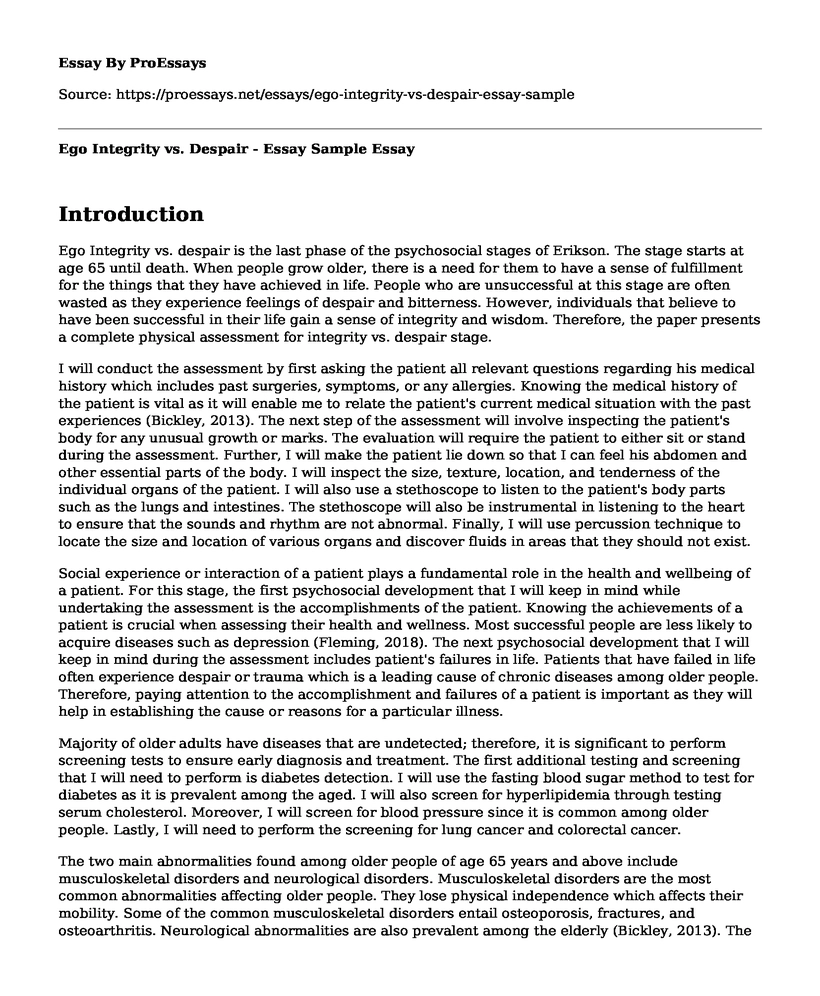Introduction
Ego Integrity vs. despair is the last phase of the psychosocial stages of Erikson. The stage starts at age 65 until death. When people grow older, there is a need for them to have a sense of fulfillment for the things that they have achieved in life. People who are unsuccessful at this stage are often wasted as they experience feelings of despair and bitterness. However, individuals that believe to have been successful in their life gain a sense of integrity and wisdom. Therefore, the paper presents a complete physical assessment for integrity vs. despair stage.
I will conduct the assessment by first asking the patient all relevant questions regarding his medical history which includes past surgeries, symptoms, or any allergies. Knowing the medical history of the patient is vital as it will enable me to relate the patient's current medical situation with the past experiences (Bickley, 2013). The next step of the assessment will involve inspecting the patient's body for any unusual growth or marks. The evaluation will require the patient to either sit or stand during the assessment. Further, I will make the patient lie down so that I can feel his abdomen and other essential parts of the body. I will inspect the size, texture, location, and tenderness of the individual organs of the patient. I will also use a stethoscope to listen to the patient's body parts such as the lungs and intestines. The stethoscope will also be instrumental in listening to the heart to ensure that the sounds and rhythm are not abnormal. Finally, I will use percussion technique to locate the size and location of various organs and discover fluids in areas that they should not exist.
Social experience or interaction of a patient plays a fundamental role in the health and wellbeing of a patient. For this stage, the first psychosocial development that I will keep in mind while undertaking the assessment is the accomplishments of the patient. Knowing the achievements of a patient is crucial when assessing their health and wellness. Most successful people are less likely to acquire diseases such as depression (Fleming, 2018). The next psychosocial development that I will keep in mind during the assessment includes patient's failures in life. Patients that have failed in life often experience despair or trauma which is a leading cause of chronic diseases among older people. Therefore, paying attention to the accomplishment and failures of a patient is important as they will help in establishing the cause or reasons for a particular illness.
Majority of older adults have diseases that are undetected; therefore, it is significant to perform screening tests to ensure early diagnosis and treatment. The first additional testing and screening that I will need to perform is diabetes detection. I will use the fasting blood sugar method to test for diabetes as it is prevalent among the aged. I will also screen for hyperlipidemia through testing serum cholesterol. Moreover, I will screen for blood pressure since it is common among older people. Lastly, I will need to perform the screening for lung cancer and colorectal cancer.
The two main abnormalities found among older people of age 65 years and above include musculoskeletal disorders and neurological disorders. Musculoskeletal disorders are the most common abnormalities affecting older people. They lose physical independence which affects their mobility. Some of the common musculoskeletal disorders entail osteoporosis, fractures, and osteoarthritis. Neurological abnormalities are also prevalent among the elderly (Bickley, 2013). The aging process reduces the activity or performance of the brain and nervous system. Neurological disorders include Parkinson's disease, neuropathy, and Alzheimer's disease.
Conclusion
Finally, I have been successful in assessing patients in this psychosocial stage because I focus on their social accomplishment and failures. Examination of the social experience of the older patients makes it easier to assess them physically. By knowing their failures or achievements in life, it becomes easier to examine and know the reason for problems or complexities in their various body organs (Bickley, 2013). For instance, I will know that the patient is suffering based on his past life experiences.
References
Bickley, L. S. (2013). Bate's guide to physical examination and history taking (11th ed.). Philadelphia, PA: Wolters Kluwer/Lippincott Williams & Wilkins. Chapters 18-20.
Fleming, J.S. (2018). "Erikson's Psychosocial Developmental Stages." Swppr.org. Retrieved on September 19, 2018, from http://swppr.org/textboo`k/ch%209%20erikson.pdf
Cite this page
Ego Integrity vs. Despair - Essay Sample. (2022, Jul 18). Retrieved from https://proessays.net/essays/ego-integrity-vs-despair-essay-sample
If you are the original author of this essay and no longer wish to have it published on the ProEssays website, please click below to request its removal:
- Why Is Racial Inequality Still an Problem in America?
- Essay Sample on Social Hierarchy in Tartuffe and Ottoman Empire
- Essay Sample on Optimism in the United States
- How Does Social Anxiety Affect Self-Esteem Paper Example
- Essay Sample on Multilingualism & Cognitive Development: A Correlation
- Social & Emotional Welfare: Beyond Cognitive Capabilities - Research Paper
- Essay Example on Global Healthcare Stressors: Strategies for Administration and Nursing Shortage







